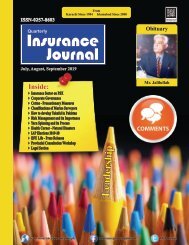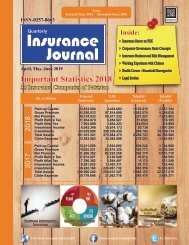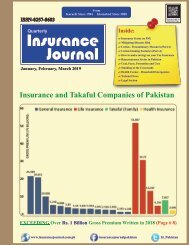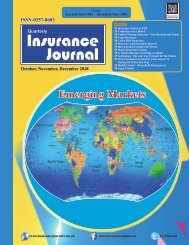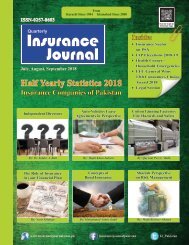Insurance Journal (3rd Quarter 2020)
Create successful ePaper yourself
Turn your PDF publications into a flip-book with our unique Google optimized e-Paper software.
Legal Section
claim application of the applicant under
sections 122, 123 of Insurance
Ordinance for recovery of insurance
claim is accepted in favour of the
application and against the respondents
amounting to Rs.500,000/- along with
liquidated damages as provided under
Section 118(2) of Insurance Ordinance,
2000 from the date of death of the
insured i.e. 21.03.2008 till its
realization at monthly rests @ 5%
higher than the prevailing base rate. The
respondents will bear the costs of the
case…
2. The learned counsel for the
appellants has raised a number of
grounds to assail the impugned
judgment but for the present purposes
we are only going to examine the
question as to whether the case of the
appellants was prejudiced when
through the order, dated 02.07.2016,
the Insurance Tribunal closed the right
of the appellant to lead further evidence
under the provisions of Order XVII<
Rule 3 of the C.P.C.
3. The learned counsel for the
appellants submits that the evidence of
some of the appellants' witnesses, as per
the appellant' list of witnesses, had been
recorded. And for the remaining
witness, included in the list, the
appellants approached the Insurance
Tribunal for summoning the said
witnesses through process of the Court.
The appellants had deposited the
process fee, the necessary expenses and
diet money for calling the witnesses,
however, the witnesses despite being
summoned/served did not appear. As a
consequence, coercive measures were
adopted by the Insurance Tribunal for
summoning the witnesses but the
witnesses failed to appear. Ultimately
non-bailable warrants of arrest of the
witnesses in question were issued but
with the same result. The Insurance
Tribunal instead of exhausting all the
means at its disposal to summon the
witnesses proceeded to close the right
of the appellants to lead further
evidence by invoking the provisions of
Order XVII, Rule 3 of the C.P.C.
4. Further submits that it sis settled law
that if a party files the list of witnesses
within the stipulated period and also
deposits the diet money and other
necessary expenses within the
stipulated period for summoning the
witnesses named in the list, through
process of the Court, then it is the duty
of the Court to summon the witnesses
and the party cannot be held responsible
for non-service of the witnesses or the
failure of the witnesses to appear and
adduce evidence. In the instant, case the
appellants had performed their duty as
required under the law but the
Insurance Tribunal in violation of the
law as laid down by the superior Courts
of the country proceeded to close the
right of the appellants to lead evidence.
Inter alia relies on the judgment
reported as “Hakim Habibul Haq v.
Aziz Gul and others” (2013 SCMR
200) to contend that the impugned order
has been passed by illegal exercise of
jurisdiction.
5. Further contends that by denying the
appellants the right to lead their
evidence the Insurance Tribunal has
prejudiced the appellant' case.
6. The contentions of the learned
counsel for the appellants on the factual
plane are borne out from the record. The
learned counsel for the respondent has
been unable to establish otherwise.
7. We are in further agreement with the
learned counsel for the appellants that
it is settled law that when a party files its
list of witnesses within the statutory
period and thereafter regularly deposits
diet money and other necessary
expenses for summoning the witnesses,
named in the list, through the process of
the Court and files an application under
Order XVI, Rule 1, of the C.P.C., for the
said purpose then it is for the Court to
ensure presence of the witnesses by all
the means available to it including
moving its coercive machinery instead
of penalizing the party for nonappearance
of the witnesses. Reliance
in this regard is placed on “ Hakim
Habibul Haq's case (supra), cited at the
bar by the learned counsel for the
appellants and the judgments reported
as “Mst. Bashir Bibi v. Aminuddin and
9 others (PLD 1973 Supreme court 45)
and “ Saleem-ud-Din And others v.
Government of the Punjab through
Secretary Education and others” (2009
MLD 635).
8. It is accordingly held that the
Insurance Tribunal exercised its
jurisdiction illegally and with material
irregularity by invoking the provisions
of Order XVII, Rule 3, of the C.P.C. and
closing the right of the appellants to
lead further evidence. The question
posed in para 2 above is answered
accordingly.
9. Under the circumstances, the
impugned judgment, dated 14.12.2016,
passed by the Insurance Tribunal is set
aside. The matter is remanded to the
Insurance Tribunal for decision afresh.
The respondent's suit shall be deemed
to be pending before the Insurance
Tribunal and shall be decided after
recording the appellants' evidence and
the respondent's evidence in rebuttal,
strictly in accordance with the law,
including the judgments cited
hereinabove. It is further directed that
the Insurance Tribunal shall endeavor
to decide the matter within four (4)
months from the date of receipt of a
certified copy of the order.
10. The office is directed to remit the
record of the case to the Insurance
Tribunal forthwith.
There is no order as to cost.
MH/S-36/L
Case Remanded.
Insurance Journal July, August, September 2020
37
Find us at: www.insurancejournal.com.pk — www.facebook.com/insurancejournalpakistan













